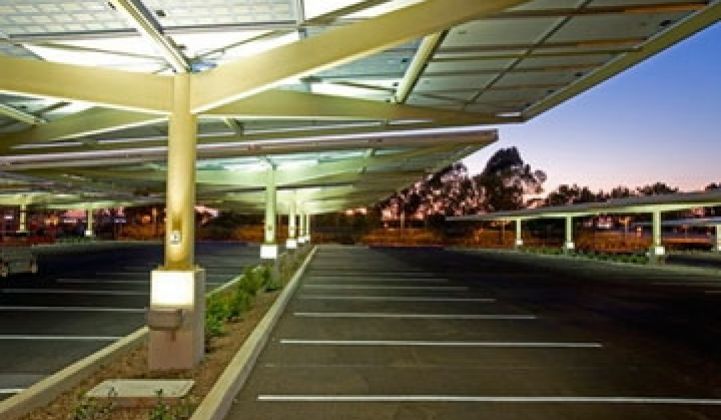A few years ago, Robert Noble, an architect, was asked to design a solar carport for Kyocera. He Googled "solar carport" and essentially, nothing turned up. No industry, no market, and no technology.
And then, "It hit him like a ton of bricks." In his thinking, carports were "the largest single market for distributed solar power generation. [. . .] It's better than drilling into a waterproofed roof," according to Noble.
"The best market for solar is out over parking lots," said Noble.
He soon left Tucker Sadler, an architectural firm, to form Envision Solar -- a startup bootstrapped by himself, his friends and his colleagues. This week, the San Diego, California-based company began trading on the OTC bulletin boards via a reverse merger.
Noble's team designed a solar “tree” with a central pillar supporting a platform topped with solar modules which shades about eight cars. A typical solar tree design can generate about 7.5 kilowatts of DC power.
One of Envision's differentiators, according to Noble, now the CEO, is that, "We are architects and planners," who know how to "design, engineer and build."
His design incorporated the idea that aesthetics were critical and that the structure needed to incorporate shade and weather protection. According to Noble, "It's not just about kilowatt-hours produced." This flies in the face of the idea that solar is a commodity.
Noble adds, somewhat controversially, that solar installation has (or will) become the domain of builders and electrical contractors like Mcbride Electric and Cupertino Electric, since these companies are already on the rooftop with extensive building experience. He claims that solar installation is now "about the building industry."
While the acronym BIPV (building-integrated photovoltaics) is tossed around quite a bit, Noble prefers the acronym SIIBS, which stands for Solar Integrated Infrastructure and Building Systems. Noble's firm has about 17 projects built, a total of about 9 megawatts installed or designed, and a "pipeline of solar parking projects."
The company has started with solar car ports but has a range of new products in development, including, naturally, adding charging stations from the likes of Coulomb to the mix. It makes sense, considering the cars and the power are already right there.
Other products in the works include tracking options for the canopies and solar trees made out of fiberglass and resin that are lighter and cheaper. Prefabricated solar buildings are also on the drawing board.
Envision has not sought out venture capital in its brief existence. With the liquidity and the ability to raise capital that comes with being a public, albeit small cap, company, Noble sees the firm as as having a scalable model with an aim of rolling-up other companies under the Envision banner.
The CEO continued, "We are absolutely unique. We are a deployment of solar that most people from the building industry can understand."



